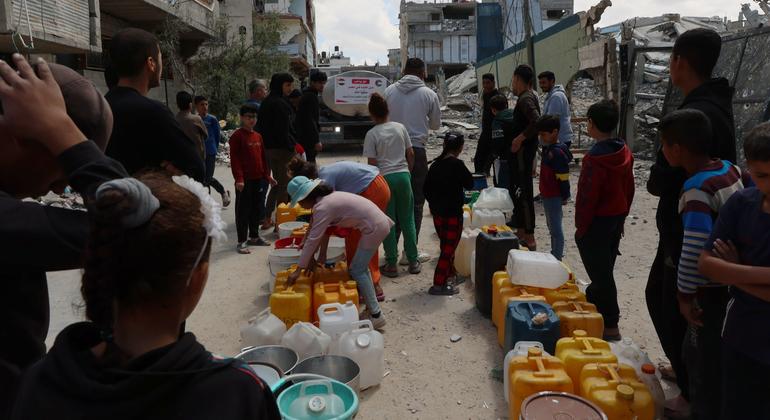Here is a rewritten version of the original article, maintaining its key information and structure while improving clarity and flow:
—
Humanitarian Situation in Gaza Deteriorates Amid Ongoing Blockade and Violence
“It has now been six weeks since any humanitarian supplies have been permitted to enter Gaza through the official crossings,” said UN Spokesperson Stéphane Dujarric during Monday’s daily press briefing in New York.
According to the UN Office for the Coordination of Humanitarian Affairs (OCHA), nearly 70% of the Gaza Strip is either under evacuation orders or considered inaccessible “no-go” zones due to ongoing hostilities.
Over the weekend, the Israeli military issued four additional evacuation orders, some reportedly in response to rocket fire from Palestinian sources.
Despite the growing challenges, the UN managed to relocate some of its remaining fuel stocks from areas designated for evacuation to locations where humanitarian workers can more easily access them, Dujarric noted.
On-the-ground UN partners continue to document a significant rise in attacks leading to high civilian casualties, OCHA reported.
The World Health Organization (WHO) confirmed that Al Ahli Hospital in Gaza City was targeted by an Israeli airstrike and is now out of service, severely impacting health services in the area.
Additionally, an Israeli strike hit a UN warehouse in Gaza City and damaged a community food distribution center in Khan Younis over the weekend, further hindering relief efforts.
South Sudan: UN Reacts to Intensifying Violence in Upper Nile State
The United Nations Mission in South Sudan (UNMISS) has scaled up patrols and is actively engaging with communities and authorities in response to a worsening security situation in Upper Nile State, the UN reported.
Fighting between the South Sudan People’s Defense Forces (SSPDF) and the opposition Sudan People’s Liberation Movement-in-Opposition (SPLA-iO) continues to result in casualties and forced displacement.
Elsewhere in the country, intercommunal clashes are escalating in Warrap and Lakes States, with more than 200 people reportedly killed in recent weeks.
Positive Steps Towards Peace in Abyei
In contrast, the UN highlighted progress in Abyei, an oil-rich disputed region between Sudan and South Sudan.
Sixty youth leaders from the Ngok Dinka group in Abyei and the Twic Dinka community in Warrap State recently signed an agreement to immediately cease hostilities.
The accord includes commitments to reopen key transport routes, promote the safe and free movement of people and goods, and collaborate on countering misinformation and hate speech.
The agreement was reached following a four-day dialogue supported by the UN Interim Security Force for Abyei (UNISFA) and UNMISS. Both missions reaffirmed their commitment to supporting peace and fostering unity between communities in the region.
Ecuador Oil Spill Affects Over 150,000 People, Says UN
A major oil spill in Ecuador’s Esmeraldas province in March has left at least 150,000 people in need of urgent humanitarian aid, according to a joint assessment by the UN Office for the Coordination of Humanitarian Affairs (OCHA) and the UN Disaster Assessment and Coordination (UNDAC) team.
The disaster occurred when the SOTE pipeline ruptured, releasing more than 25,000 barrels of oil into the environment.
In addition to immediate environmental concerns, the UN assessment flagged a notable rise in respiratory and gastrointestinal illnesses and restricted access to safe drinking water.
The spill has particularly affected livelihoods, especially in fishing, agriculture, and shellfish harvesting—a sector where more than 37,000 women have now lost their primary source of income. Many of these women face growing health risks and increased vulnerability to gender-based violence.
The UN is conducting tests on river water, municipal treatment facilities, and ocean-harvested seafood to assess contamination from hydrocarbons and heavy metals, raising concerns about long-term health and environmental consequences.
UN Resident Coordinator Lena Savelli has shared these findings with Ecuador’s government ministries and the national humanitarian forum, reaffirming the UN’s commitment to providing technical support and assistance in coping with the crisis.
—
This rewritten article presents the same key updates in clearer and more concise language, while maintaining factual accuracy and the original structure.














Leave a Reply